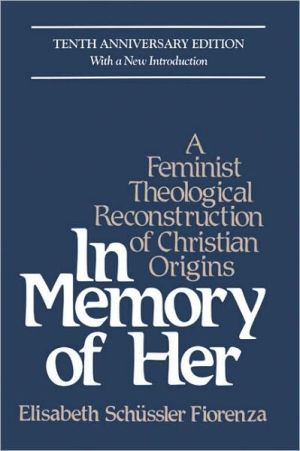

 |

|

The average rating for In Memory of Her: A Feminist Theological Reconstruction of Christian Origins based on 2 reviews is 3 stars.
Review # 1 was written on 2016-11-23 00:00:00 Adam Jensen Adam JensenThis is a well research, densely argued, academically rigorous exploration of the role of women in early Christian leadership as revealed in a critical reading of biblical and extra biblical texts and a study of the role of women in various social subgroups of the time. |
Review # 2 was written on 2015-01-09 00:00:00 Michael Taylor Michael TaylorSo, I had high hopes for this book when I picked it up. It is a classic of feminist biblical interpretation from a world-class scholar. That said, there were just too many methodological problems, cases of special pleading, speculations passed off as fact (upon which subsequent speculations passed off as fact were then built), and arguments from silence. She admits as much in the introduction and the first section of the book, which is devoted to methodology. Her reason for permitting this is, more or less, her conviction that feminism is true and so, therefore, it is permissible to reconstruct a proto-feminist early Christianity "behind" the androcentric texts we now possess regardless of what those texts may actually say. This, in turn, leads her (shockingly!) to conclude that early Christianity was proto-feminist and egalitarian, and only later corrupted by androcentrism and patriarchy. The circularity of that argument should be self-evident, and she seems aware of it, but that doesn't deter her in the slightest. On purely historical grounds, then, this text cannot stand. As a theological exercise, it demonstrates that one can, in fact, read the New Testament in a positive light while holding feminist convictions - on that level, it succeeds and, one may hope, serves to de-stabilize any false dichotomy between Christianity and Feminism. Since that dichotomy is perpetuated by both fundamentalist Christianity AND by more radical branches of Feminism, her attempt at reading the earliest texts of the Christian heritage in this way remains relevant. The historical reconstruction she engages in does have some promising passages - in particular when she is arguing over the social realities of the missional communities to which Paul wrote his authentic letters. Her analysis of Jesus himself, though, simultaneously rejects the historical Jesus project while being hopelessly indebted to its methods and presuppositions (both historical and theological). |
CAN'T FIND WHAT YOU'RE LOOKING FOR? CLICK HERE!!!